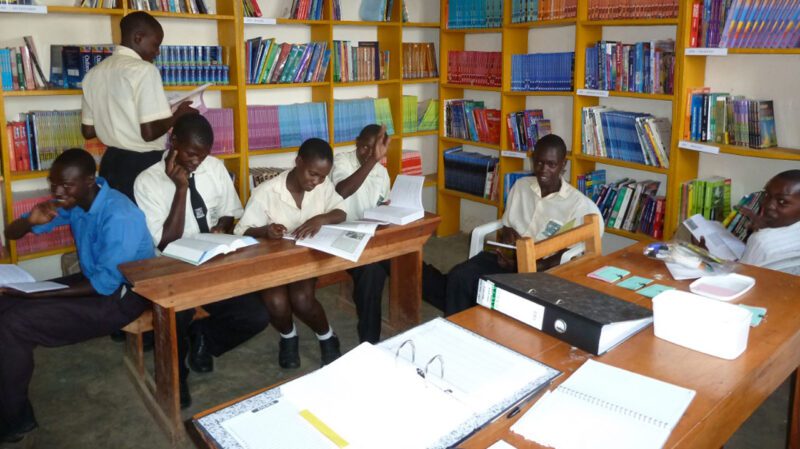Africa
The Decline And Revival Of Reading Habits Among Nigerian Students, by Adde Shuaibu

In an age defined by the rapid flow of digital information, reading habits among Nigerian students have undergone profound changes. While once a pillar of personal and academic development, reading for leisure and self-improvement has increasingly taken a backseat. From social media to the high costs of books and a general lack of well-equipped libraries, a myriad of factors affects students’ relationships with reading. However, beneath the shifting trends, there remains a growing awareness of reading’s invaluable role in the lives of young Nigerians.
Historically, reading was a prominent activity, driven by a desire for knowledge and educational advancement. However, in recent years, the habit has seen a noticeable decline among students across Nigeria. Studies have shown that a significant number of students read solely to pass exams, engaging little with reading materials outside of the prescribed syllabus. The once-popular culture of personal book collections and novel exchanges between friends has faded as students turn to quick, consumable content on smartphones.
For many Nigerian students, the advent of smartphones and social media has drastically altered reading patterns. Platforms like Instagram, Twitter, and WhatsApp present endless streams of content that are quick to consume and easy to share, overshadowing the often solitary, immersive act of reading a book. The constant notifications and entertainment options can make focusing on books seem laborious in comparison. As a result, while students are increasingly “connected” online, the connection to traditional reading weakens.
Nevertheless, this shift towards digital media does not necessarily mean Nigerian students are reading less altogether. Rather, the type of material and the medium have changed. Students often read news articles, blogs, or short articles online, though these typically do not provide the depth and concentration that books offer. This transformation highlights the need for a balanced approach, where technology serves as a tool to enhance, not replace, the practice of reading.
Economic factors also play a considerable role in Nigeria’s reading culture. Books are costly, and with the economic realities many students face, purchasing books can be seen as a luxury rather than a necessity. In many communities, libraries are either outdated or lack sufficient funding, limiting students’ access to reading materials. Furthermore, school libraries, especially in public institutions, are often poorly equipped, making it challenging for students to cultivate a love for reading.
The decline In well-resourced libraries reflects a larger structural issue: limited investment in educational resources. For students, the absence of access to quality reading materials stifles curiosity, intellectual growth, and personal engagement with diverse ideas. While some schools and organizations strive to make books accessible, the reach is still limited, leaving many students without regular exposure to books outside of the classroom.
Despite these challenges, a movement toward reviving reading habits is gradually taking shape among Nigerian students. In recent years, there has been a rise in book clubs, literary festivals, and digital reading platforms aimed at reigniting students’ interest in books. Initiatives like the Akada Children’s Book Festival and the Ake Arts and Book Festival provide vibrant spaces for young readers to engage with literature. Book clubs organized in schools, universities, and communities are fostering environments where students can rediscover reading as a shared experience rather than a solitary chore.
Additionally, digital reading platforms such as OkadaBooks and Bambooks offer affordable access to a wide range of Nigerian and international books, bridging the gap between students and literature. Through these platforms, young Nigerians can access books on smartphones and computers, making reading more convenient and compatible with modern lifestyles. Some universities are also taking steps to update their libraries with e-books and online resources, giving students greater flexibility in choosing how they access reading materials.
The influence of teachers and parents cannot be underestimated in shaping students’ reading habits. Educators who introduce engaging and relatable materials inspire students to read beyond the curriculum. Programs that encourage interactive reading activities, such as literature circles and book discussions, can help make reading more appealing to students. Meanwhile, parents who read to their children from an early age and introduce books as enjoyable and valuable parts of life lay the foundation for lifelong reading.
Moreover, teachers can creatively incorporate technology to make reading appealing. For instance, using e-books, reading apps, or online discussion forums to complement classroom readings can help bridge the gap between traditional and digital reading. By nurturing a balanced approach, educators can instill in students a deeper appreciation for reading.
The reading culture among Nigerian students may have declined, but the potential for revival is evident. With the right mix of digital resources, accessible books, supportive educators, and community initiatives, there is hope that reading can regain its status as a cornerstone of Nigerian students’ intellectual and personal growth. The journey ahead may require structural changes and sustained effort, but each small step brings Nigeria closer to a future where reading is once again a cherished habit among its youth.
In an era defined by constant change, reading remains a timeless practice that sharpens minds, broadens perspectives, and deepens empathy. For Nigerian students, rediscovering the value of reading could mark a new chapter, one where they are equipped to face the complexities of the world with knowledge, wisdom, and imagination.
Adde Shuaibu, a 300 level student from Department of Mass Communication Borno State University, Maiduguri
























